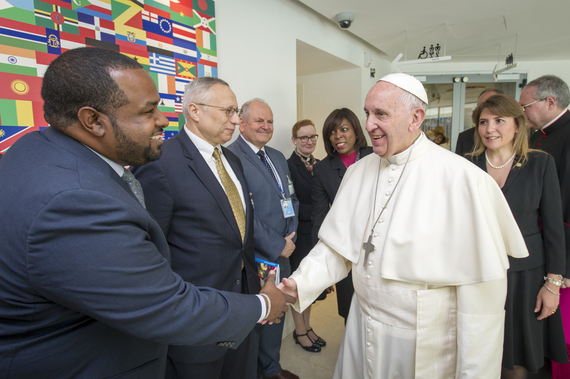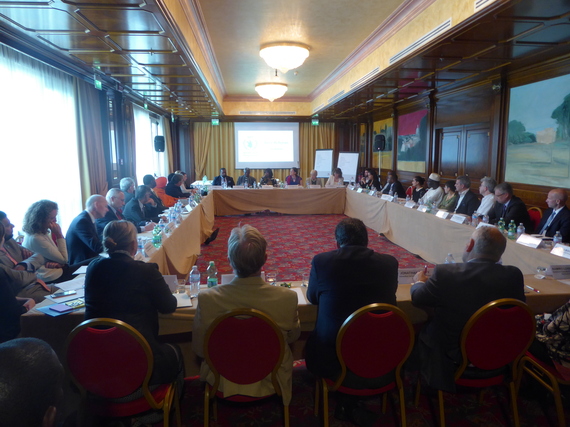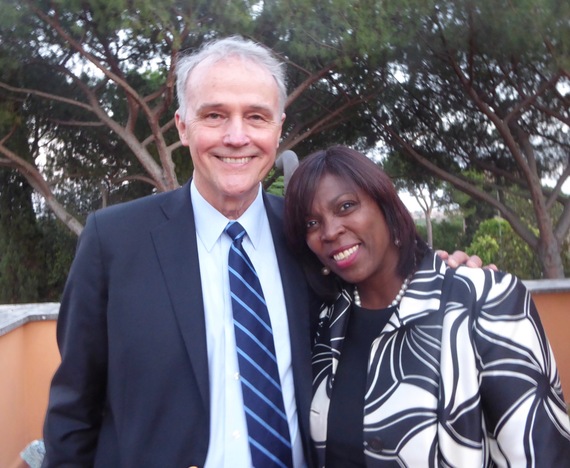Zero hunger by 2030: that call, the echo of Sustainable Development Goal #2, was blessed by the General Assembly of the United Nations in September 2015. At the Rome headquarters of the UN World Food Programme (WFP), June 13 saw a sharp focus on the ethical and religious as well as practical dimensions of this goal. Pope Francis, in a first ever visit to WFP, echoed the call for Zero Hunger and reflected on what it involves. In parallel WFP's governors explored with WFP's leadership and an interreligious group how religious institutions and beliefs are involved in the global and local call to action to end hunger by 2030.
Ending hunger involves at least four areas for action. First, it means getting enough food to the right places, and ensuring that food is accessible to those in need. Second, the "monster" of malnutrition that stunts bodies and minds of children and adults can be defeated only with multidimensional approaches that convey information and encourage healthy behaviors, including breast-feeding babies and balanced diets for all. Third, agriculture is deeply involved as the motor for production, meaning land reform, research, knowledge for farmers, and attention to sustainability. The world's gigantic and dynamic food markets must be part of the solution. And fourth, Zero Hunger demands a political will grounded both in a conviction that hunger is unacceptable in a just, modern society and that acting on that conviction can and must be a priority.
It is ironic that virtually every religious tradition has from time immemorial focused on food and hunger but paths towards common engagement to end hunger have often lacked strategic focus. Religious communities are powerful advocates for action - witness, for example, the relentless focus of Bread for the World in the United States on political action, the central focus of the Sikh tradition, Langar, on serving others through free meals, and the hundreds of thousands of soup kitchens and food pantries across the world that focus on those in need. The World Faiths Development Dialogue (WFDD) is documenting the extraordinary diversity of religious engagement on every dimension of the zero hunger challenge. When WFP called on its regional offices for example of partnerships with faith traditions, it was flooded with examples from every world region. But better and well analyzed knowledge of what is being done is needed if the full potential for a global effort is to be realized.
Pope Francis in his WFP address called Zero Hunger "a great goal", and gave high praise to WFP's work, as an institution that focuses less on its declarations, than on the work of its members. He stressed two themes: the "normalization" of extreme poverty as people grow immune to people's tragedies as they are overloaded with information in this interconnected world of instant communications. "We hear weeping but do not comfort it". His solution: not "broad reflections or .. endless discussion, constantly repeating things everyone knows" but working to "de-naturalize" or de-normalize extreme poverty. As an example he focused on food waste: "Food discarded is in a sense stolen from the table of the poor and the starving". And he also attacked bureaucratic behavior: "Forms of aid and development projects are obstructed by.. incomprehensible political decisions, skewed ideological visions...", and hunger is even used as a weapon of war. He urged that consciences be de-anesthetized: "Do not grow weary or let problems dissuade you. Believe in what you are doing and pursue it enthusiastically", he urged WFP's staff. His call was for creative solutions leading to change and transformation
Interreligious discussions, first with WFP's leadership and then its governors, highlighted similar themes. Partnerships on hunger issues are a natural focus for action, less controversial than other development and humanitarian goals. With the deep engagement of religious institutions, in humanitarian action in situations of war and conflict but also in local communities everywhere, there are countless opportunities to work better together to end hunger. The discussions brought together Catholic, Muslim, Protestant, Buddhist, Hindu, Sikh, and boldly interreligious perspectives, as exemplified in supporting statements received from widely varied leaders. They echoed bold calls for immediate action.
What we need most of all is a new and genuine conviction that hunger can and must end, and that Zero Hunger is a universal, shared moral and political call. That means that every case of hunger demands action. Zero means no case of hunger is acceptable.



